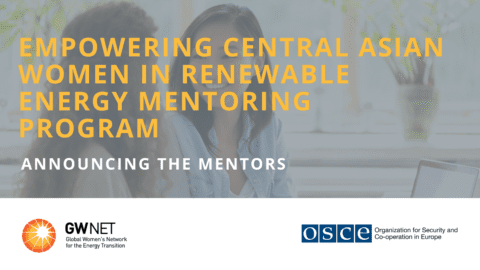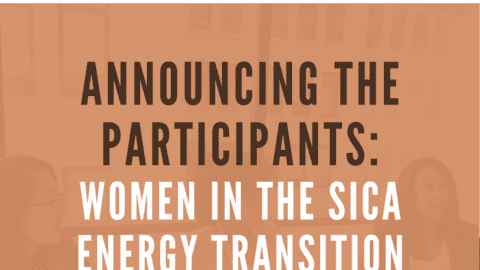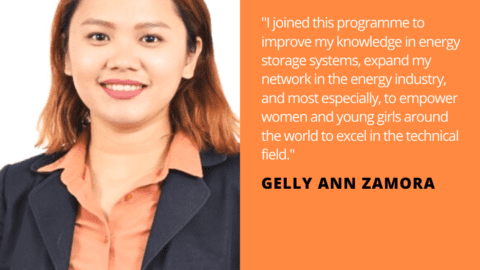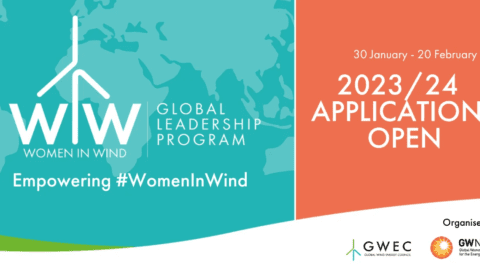GWNET brings you the 15th instalment of the “Meet the Women in Clean Cooking” series which celebrates the work and achievements of the women who are part of the Clean Cooking Mentorship Program. This program is made up of 30 mentee-mentor tandems, with mentees from over 15 countries. Meet Clean Cooking mentee, Rejoice Ntiriwaa Ossei-Bremang, a lecturer at the Cape Coast Technical University and a PhD Researcher at Kwame Nkrumah University of Science and Technology in Ghana.
1) Tell us a little about yourself. What do you love most about what you do?
I enjoy the technology acceptance phase of my research work. This is where I get the privilege to interact with the women within the processing food at small scale industries in Ghana to assess their perspectives on Improved Cookstoves (ICs). I get the opportunity to educate them on the benefits of ICs and also encourage them to invest in such technologies, thus the modern energy cooking devices (improved biomass stoves and LPG).
2) What were your goals when you started working in clean cooking? How have these evolved?
My goal has been to design portable improved biomass cookstoves for women in the small-scale industries as a means to control the atmospheric pollution, health hazards, gender imbalance and climate quagmire associated with the three stone stoves that are currently in use by them. I also want to formulate economically viable biofuels from agricultural residues for diversity in the fuel mix.
I was motivated to do further research in sustainable energy technologies at the Kwame Nkrumah University of Science and Technology, specifically in the area of clean cooking due to my overarching desire to help women in small-scale industries.
As shown in the pictures below, their current stoves are associated with; poor designs with excessive heat generation and smoke emission. Even though their condition is very deplorable, they are reluctant to get new institutional stoves because of the following reasons; the immediate cost involved in acquiring an LPG or electric stove; ergonomic and aesthetic constraints; and regular maintenance requirements.

Image: Traditional three-stone stove, using kernel shells as fuel
3) What are the opportunities for clean cooking in your country?
There are a lot of prospects in the area of design technologies. As stated earlier, research revealed that there is a market size of over 2.2 million households in rural Ghana who are still using three-stone stoves. This data excludes those in the small-scale industries who use firewood in the same stove.
According to the sustainable energy for all plan, by 2030, half the total number of households in Ghana are expected to adopt LPG as a primary cooking fuel and the remaining half, an improved biomass cookstove. Further, the government is working towards the scale-up of the dissemination of ICs (institutional/commercial) from three thousand users in 2020 to eighteen thousand users by 2030.
The above target by the state calls for interventions that would satisfy the need of the end-users to aid in easy acceptance and dissemination. In this regard, there would be job creation for interested artisans in the sector who would manufacture the cookstove and also promote women and girl’s empowerment through access to improved cooking technologies. Hence, increased investment in this sector is encouraged in the area of advocacy, technical capacity building, and research and development.
The major challenge is to get the users of the old technology to understand and accept the need for an immediate replacement of their traditional stoves based on all the problems associated with it.
This has partly resulted from the challenges associated with the current designs on the market, in terms of ergonomics and aesthetics. Most of the end-users feel it would not meet their needs, although they could be efficient in terms of exergy and energy. Also, securing funding for research and development is one of the hurdles.
In an attempt to address these challenges, I have collaborated with Ada Palm Kernel Oil Association in the Eastern Region of Ghana to design a prototype stove to fit into their cooking practices. This group is serving as a case study with a population of about 250 women, after which a scale-up would be made to reach other vendors. Currently, a simulation model is being worked on using finite element and computational fluid dynamics, to ensure an optimum design concept for the small-scale industry players.
In the area of funding, my research team lead has contacted several agencies but there has been no positive response.
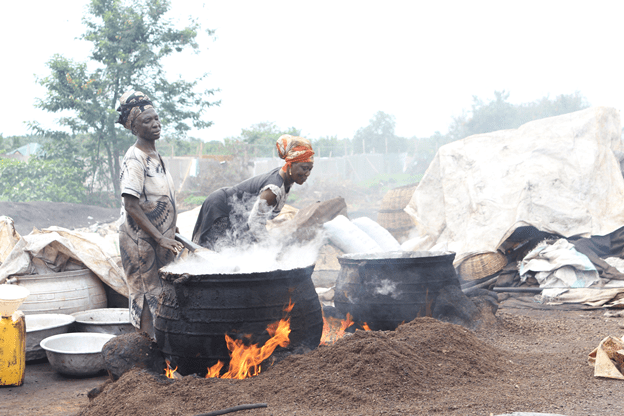
Image: Rejoice’s current project, with the women within her case study group – Ada Palm Kernel Oil processing rural small-scale company in the Eastern Region of Ghana.
I would love to team up with the government to establish well-equipped training centers to provide technical and entrepreneurial training programs to interested groups and individuals on clean cooking technologies.
This technical capacity building will target areas such as design construction of improved household and institutional cookstoves, design and construction of small-scale biomass briquetting and pelleting machines, design of biogas digesters to meet the cooking needs, and the repair and maintenance of these appliances.
I expect the mentorship program to fine-tune my journey in cleaning cooking and also provide me with the needed skills and networks for effective collaboration with agencies that are set to solve this global problem.
6) What advice would you give to women hoping to join the clean cooking sector?
I would love to encourage them to come on board so that we can all achieve the universal energy access target together. They should be motivated by the fact that we are the majority group in the area of cooking and therefore the best solutions and intervention would come from us.
Furthermore, gender mainstreaming in the area of energy access has become more important in this decade of action. This means that a lot of research and human resources are needed. Therefore, I gladly welcome them on board irrespective of where they fall within the IC value chain.
Read more about GWNET’s mentoring programmes here.



